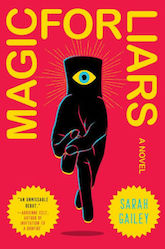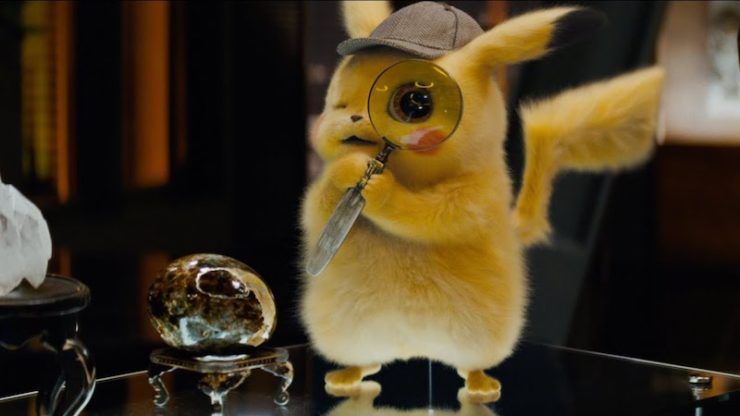I have a confession to make: Despite being around the right age for it, I never really got into Pokémon. And then I failed to get into Pokémon Go when that happened, aside from watching friends catch the lil guys on sidewalks and buses and at brunch for that glorious six month period when everyone was doing it.
But I was hoping to enjoy Detective Pikachu all the same, and happily I was not disappointed.
There is a comforting familiarity in the film once it becomes clear that it perches in that same cross section of species integration and noir detective fiction that Who Framed Roger Rabbit? turns on. Even if it didn’t star a Pikachu (voiced by Ryan Reynolds) in a deerstalker cap and meld the fictional universe of Pokémon with our own through animation, there’s the added similarity of Pokémon being second class citizens which Roger Rabbit used impressively to better frame its society and the conflicts therein. Detective Pikachu does a decent job of using a similar conflict to power its story, helped along by a murder mystery…
Tim Goodman (in a heartfelt turn from Justice Smith) is going nowhere fast when he learns that his father, a Ryme City detective named Harry, has just died in a car crash. When he arrives to see to his father’s affairs, he meets an amnesiac Pikachu who can only be understood by him, a Pokémon who turns out to be his father’s partner. Said partner is convinced that dad is alive, but that his collision was attempted murder, and he means to find out just what happened. Throw in a young and hungry hard-hitting reporter with an unpaid internship named Lucy (Kathy Newton), and a visionary billionaire who created the entirety of Ryme City as a means of melding the human and Pokémon world (Bill Nighy playing Howard Clifford), and you’ve got one weird world and a mission worth all the espressos that Pikachu downs through the film.
Buy the Book


Magic for Liars
Even if you don’t know a thing about Pokémon, there’s something captivating about the world of Detective Pikachu. Seeing a city full of furry and feathered and scaly pals bumping up against the human population is what gives the film its charm and the effect is so seamless that you can enjoy that change at face value without getting stuck on logistics… though the logistics are fun to imagine too. It’s likely that you’ll enjoy the film a little bit more if you’re a Pokémon fanatic, but some of the reveals are genuinely more entertaining when you can simply enjoy the strangeness of it all. (The scene with Mr. Mime lends itself to that sensation beautifully, as the uninitiated can’t help but think How on earth is THIS a Pokémon? Why would you do this to us?)
There are clear callbacks to the roots of the Pokémon mythos, if we want to call it that: Outside of Ryme City, Pokémon are called to do battles with their human trainers, but we get surprisingly little information on that part of the world, and it’s unclear if the battles are considered inhumane by humans. Instead we get Ryme City’s Pokémon/human partnerships as a replacement. Smith and Reynolds are an adorable team, far less zany and hardboiled than what Roger Rabbit gave us thirty years ago, but it’s fun to see the dynamic reversed—here, Pikachu is the supposedly-seasoned detective veteran, with Tim running along behind him and Lucy, desperate for nothing more than closure on his father’s possible survival. Lucy also has a Pokémon partner in Psyduck, who serves as an explosive (literally) straight man to everyone else’s antics as the mystery gets more involved.
(From here below, there be SPOILERS.)
There are certain tropes that the film embraces without thought that are a bit irritating—Tim’s mom died years earlier of cancer and we never get to see her, even in memories. We also don’t see much of his grandmother, despite how important she is supposed to be in his life. There are a few other obvious calls in the script that will sail right by kids, but probably not adults; we’re clearly directed toward Howard Clifford’s son (Chris Geere) as the potential villain, but seeing as Nighy is the better known actor, it’s not hard to guess who the real bad guy is. We also know that the reveal of Tim’s dad is going to be partly about the actor playing him because we never see the man’s face in any flashbacks.
Unfortunately Howard Clifford’s villainous arc is where the film completely falls apart. Suffering from a rare disease, the audience is told that Clifford became obsessed with Pokémon in the search for a cure, but later abandoned his search to create Ryme City, a place where Pokémon are simply part of the city’s population, and never have to do “battles” with their human trainers egging them on. But of course this is all a ruse—Clifford means to place his consciousness into the body of the most powerful and ancient Pokémon, a Mewtwo… and he also means to do the same for the rest of humanity, without ever asking if that’s what people want. His reasoning is that “Pokémon can evolve into the best versions of themselves”, which is something he feels robbed of in being confined to a wheelchair. Not only is this rote and thoughtless ableism at its finest, but it’s further made ridiculous by the fact that Clifford made Ryme City. If he felt his wheelchair was limiting, he could have easily funneled money into making his metropolis the most accessible city in the world, but instead he spends it on trying to rob Pokémon of their bodies?
The ableism is further borne out when Clifford instantly falls out of his wheelchair the moment he’s defeated, portraying him as weak and incapable once he can’t have his way. It’s deeply hurtful and terrible plotting on top of it—given his obsession with evolution, there was no need to centralize a disability or chronic illness in Clifford’s story at all. It clobbers an otherwise charming kids narrative at the moment when it needed to be sharper and more aware of itself. It makes the world of Detective Pikachu far less enticing than it is everywhere else in the film.
But the weirdest reveal of all is from Pikachu himself—it turns out that Pikachu and Mewtwo were in cahoots to stop Clifford, and in order to keep Harry Goodman safe, the Mewtwo simply deposited the guy into Pikachu’s body, and later removes him. Which means that not only is Tim’s dad alive, but he’s also—you guessed it—Ryan Reynolds. And Pikachu goes back to being a normal Pikachu.
On the one hand… what the ever-loving what?
On the other hand, this choice is weirdly sweet, and gives the film surprising dimension where you expect it least. Tim has a terrible relationship with his dad because they both handled his mother’s death by turning inward, but Harry had been trying to make inroads with his son before his supposed “death.” Tim’s guilt over not making amends is what powers the film, and connecting with the Pikachu as a sort of proxy for his father, that then turns out to be his father. Tim never gives the well-worn Pokémon cry—Pikachu, I choose you!—but he does tells the little yellow fluffball “I need you” when the case is at its roughest and li’l Pika isn’t feeling up to the task.
Which means that, when all is said and done, Detective Pikachu chooses family. And that’s strangely wonderful in the midst of this oddball film.
Emmet Asher-Perrin still definitely laughed at the Reynolds reveal, though. You can bug him on Twitter, and read more of her work here and elsewhere.










